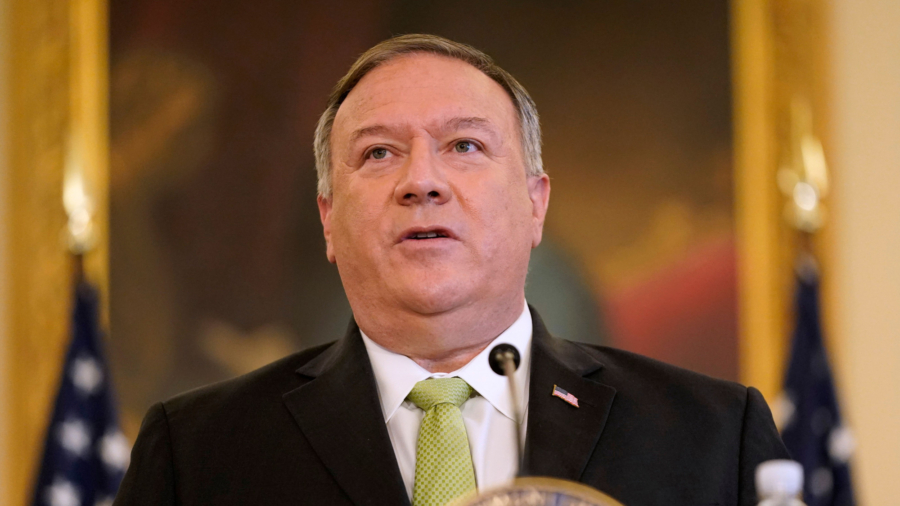The CIA and its former Director Mike Pompeo have been sued by a group of journalists and lawyers who claim the agency spied on them when they visited WikiLeaks founder Julian Assange while he was living inside the Ecuadorian Embassy in London.
The lawsuit, which also names Spanish security firm Undercover Global as a defendant, was filed in the U.S. District Court for the Southern District of New York on Aug. 15.
Plaintiffs in the lawsuit include journalists Charles Glass and John Goetz and attorneys Margaret Kunstler and Deborah Hrbek, who have represented Assange.
They argue that the agency violated their Fourth Amendment rights against unreasonable search and seizure.
“The United States Constitution shields American citizens from U.S. government overreach even when the activities take place in a foreign embassy in a foreign country,” said Richard Roth, the lead attorney representing the plaintiffs.
According to the suit, the plaintiffs were required to surrender their electronic devices to Undercover Global prior to visiting Assange at the embassy between January 2017 and March 2018.
The lawsuit claims that “unbeknownst to each of the visitors” and “without their consent” Undercover Global, acting without the knowledge of the Ecuadorian government, swept information on their electronic devices, including communications with Assange, and provided it to the CIA, which was then headed by Pompeo.
Plaintiffs say the sweeping of the data from phones was authorized and approved by Pompeo.

‘Extensive Surveillance Program’
Furthermore, the lawsuit alleges that the CIA approved and Undercover Global implemented an “extensive surveillance program” in the embassy through which they placed microphones around the building that converted video surveillance of Assange to audio-video surveillance. It also claims those recordings were handed to the CIA and “ensured that the CIA could in real time be able to directly observe and listen to Assange’s daily activities at the Embassy.”
It further alleges that the CIA and Undercover Global “surreptitiously copied and took images of the passports, including pages with stamps and visas, of all visitors” and “seized, dismantled, imaged, photographed and digitized the computers, laptops, mobile phones, recording devices and other electronics brought into the Embassy by the plaintiffs, including but not limited to IMEI and SIM codes, fronts, backs and insides of visitors’ devices, downloaded stored material.”
Data stored on the devices included, among other things, confidential and privileged information and documents from or about journalists’ confidential sources; and the Plaintiff attorneys’ clients, according to the lawsuit.
This, they claim, invaded their privacy without notice, authorization, or consent.
Plaintiffs note in the suit that their visits to Assange at the embassy were legal and permitted by Ecuadorian authorities, and took place under Ecuadorian jurisdiction in the embassy.
“While the named Plaintiffs initiate this action, the practices complained of violate the rights of well over 100 American citizens who visited Assange at the Ecuadorian Embassy in London, England,” the filing added, noting these individuals included “attorneys who were then representing him, journalists there to interview him, and even doctors who were then treating him.”

Facing Extradition
Plaintiffs in Monday’s lawsuit are seeking monetary and injunctive relief for violations of the Fourth Amendment to the United States Constitution.
Assange sought refuge inside Ecuador’s London Embassy from 2012 until he was arrested in April 2019 for skipping bail during a separate legal battle.
He is being held in London’s high-security Belmarsh Prison and has argued that he won’t get a fair trial in the United States, where he is wanted on 18 criminal charges of breaking an espionage law and conspiring to hack government computers after WikiLeaks published a U.S. military video in 2010 showing a 2007 attack by Apache helicopters in Baghdad that killed multiple civilians, including two Reuters news staff.
It then released thousands of secret classified files and diplomatic cables.
Assange faces up to 175 years behind bars if convicted. He has filed an appeal against his British extradition order to the United States and is awaiting a ruling.
The CIA and Undercover Global could not be reached for comment.
From The Epoch Times


